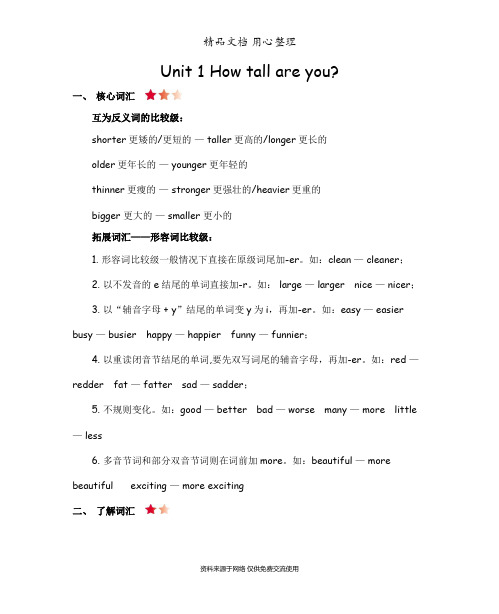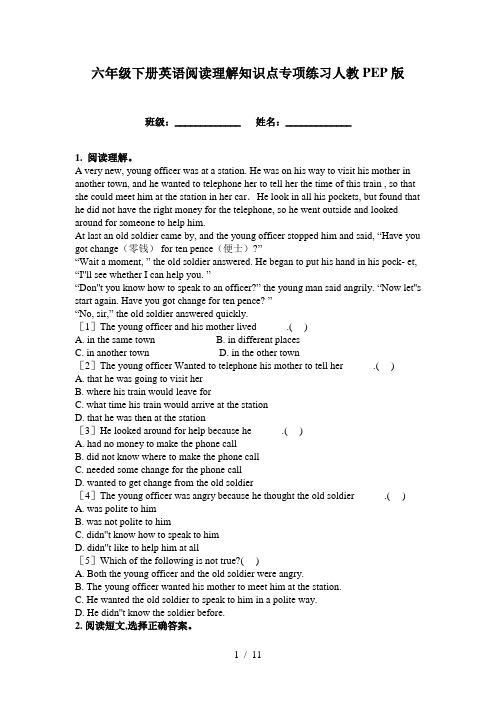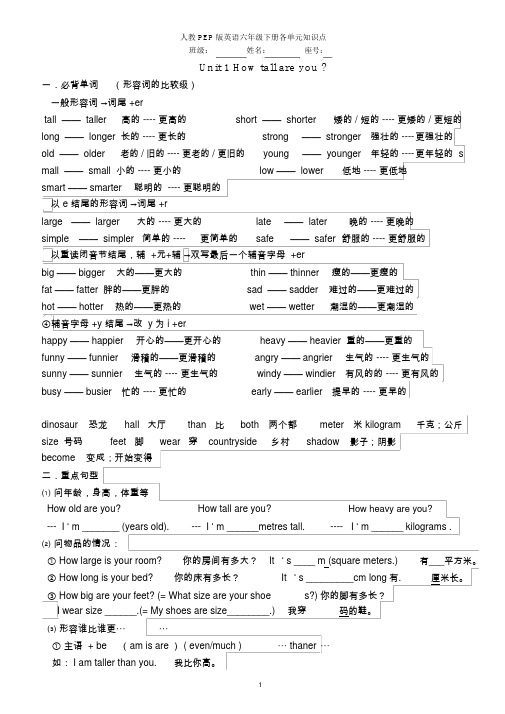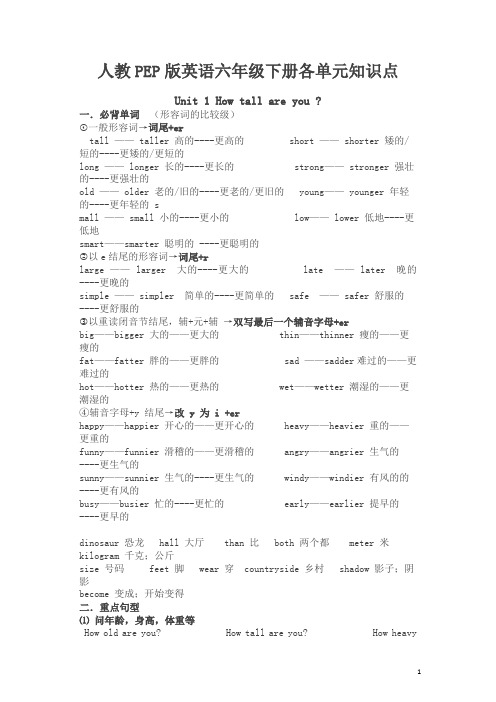PEP小学六年级英语下册知识点归纳及练习
新人教PEP版六年级下册小学英语 Unit 1 单元知识点小结

Unit 1 How tall are you?一、核心词汇互为反义词的比较级:shorter更矮的/更短的— taller更高的/longer更长的older更年长的— younger更年轻的thinner更瘦的— stronger更强壮的/heavier更重的bigger 更大的— smaller 更小的拓展词汇——形容词比较级:1. 形容词比较级一般情况下直接在原级词尾加-er。
如:clean — cleaner;2. 以不发音的e结尾的单词直接加-r。
如: large — larger nice — nicer;3. 以“辅音字母 + y”结尾的单词变y为i,再加-er。
如:easy — easier busy — busier happy — happier funny — funnier;4. 以重读闭音节结尾的单词,要先双写词尾的辅音字母,再加-er。
如:red —redder fat — fatter sad — sadder;5. 不规则变化。
如:good — better bad — worse many — more little — less6. 多音节词和部分双音节词则在词前加more。
如:beautiful — more beautiful exciting — more exciting二、了解词汇dinosaur恐龙hall大厅metre米(美式英语: meter)than比both两个都 kilogram千克;公斤countryside乡村lower(low的比较级)更低地shadow阴影;影子smarter(smart的比较级)更聪明的become开始变得;变成三、核心句型1. — How tall are you?你有多高?— I’m 1.64 metres. 我身高1.64米。
2. — What size are your shoes, Mike?迈克,你穿多大号的鞋?— Size 7. 7号。
人教版PEP六年级英语下册第一单元知识点归纳

人教版PEP六年级英语下册第一单元知识点归纳六年级下册第一单元知识点归纳四会单词:XXX更高的short—shorter更矮的strong—stronger更强壮的old—older年龄更大的young—younger更年轻的big—bigger更大的heavy—heavier更重的long—longer更长的thin—thinner更瘦的small—smaller(体型)更小的四会句型:How tall are you?你有多高?I’m 164 cm tall.我164厘米高。
You’re shorter than me. 你比我矮。
You’re 4 cm taller than me.你比我高4厘米。
How heavy are you?你有多重?I’m 48 XXX.我48千克。
应该掌握的知识点:1、表示两者之间有所比较时,句子中的形容词要用比较级形式。
形容词变为比较级的变化规则:(1)一般情况下,在形容词的词尾直接加er。
如:tall—tallershort—shorter.(2)以字母e结尾的形容词,在词尾直接加r,如:nice—te—later(3)以重读闭音节结尾,且结尾只有一个辅音字母的词,先双写这个辅音字母,再加er.如:big—biggerthin—thinnerfat—fatter(4)以辅音字母加y结尾的双音节形容词,先变y为i ,再加er。
如:easy—XXX—XXX—funnier.形容词比较级的变化口诀原级变为比较级,通常er加上去。
若是结尾辅元辅,辅音双写要牢记。
辅音加y末端时,把y变i是必需。
原级若以e末端,间接加r不忏悔。
2、部分形容词比较级的不规则变化:good—betterwell—betterbad—worsebadly—worsemany—moremuch—XXX—lessfar—farther3、同义句:How tall are you?==What’s your height?How heavy are you?==What’s your weight?4、以How开头的问句(仅限小学阶段):How are you?问身材状况。
人教PEP版六年级下册英语科各单元知识点

Unit One知识点一:形容词/副词的比较级变化规则(适用于单音节词和部分双音节词)1.在词尾加er,如tall→taller;2.以字母e结尾的词,在词尾加r,如nice→nicer;3.以辅音字母+y结尾的形容词,先把y变为i,再加er,如early→earlier;4.以重读闭音节结尾的形容词,要双写最后一个字母,再加er,如big→bigger,hot→hotter,thin→thinner,fat→fatter,red→redder。
不规则变化的比较级:many/much→more,good/well→better,little→less(表示“更少”,修饰不可名词)知识点二:比较级常用句型1.You’re taller than me.你比我高。
2.I’m one year older than you. 我比你大一岁。
3.Which is nice,the red one or the green one ?哪一个更好看,红色的还是绿色的?知识点三:部分双音节和多音节形容词的比较级部分双音节和多音节形容词,在词前加more构成比较级,如interesting→more interesting,difficult→more difficult(更困难的)知识点四:比较级+and+比较级比较级+and+比较级:可表示“越来越……”,如:1. longer and longer:表示“越来越长”2.taller and taller:表示“越来越高”3.more and more interesting:表示“越来越有趣”知识点五:how tall/heavy/long的用法How tall:表示“多高”How heavy:表示“多重”How long:表示“多长”知识点六:size与what sizeSize:表示“大小,尺寸”What size:表示“几码,多大尺寸”知识点七:形容词/副词最高级的变化规则(适用于单音节词和部分双音节词)1.在词尾加est,如tall→tallest2.以字母e结尾的词,在词尾加st,如nice→nicest3.以辅音字母+y结尾的形容词,先把y变成i,再加上est,如early→earliest;4.以重读闭音节结尾的形容词,要双写最后一个字母,再加est,如big→biggest,hot→hottest,thin→thinnest,fat→fattest,red→reddest。
六年级下册英语阅读理解知识点专项练习人教PEP版

六年级下册英语阅读理解知识点专项练习人教PEP版班级:_____________ 姓名:_____________1. 阅读理解。
A very new, young officer was at a station. He was on his way to visit his mother in another town, and he wanted to telephone her to tell her the time of this train , so that she could meet him at the station in her car.He look in all his pockets, but found that he did not have the right money for the telephone, so he went outside and looked around for someone to help him.At last an old soldier came by, and the young officer stopped him and said, “Have you got change(零钱) for ten pence(便士)?”“Wait a moment, ” the old soldier answered. He began to put his hand in his pock- et, “I''ll see whether I can help you. ”“Don''t you know how to speak to an officer?” the young man said angrily. “Now let''s start again. Have you got change for ten pence? ”“No, sir,” the old soldier answered quickly.[1]The young officer and his mother lived______.( )A. in the same townB. in different placesC. in another townD. in the other town[2]The young officer Wanted to telephone his mother to tell her______.( )A. that he was going to visit herB. where his train would leave forC. what time his train would arrive at the stationD. that he was then at the station[3]He looked around for help because he______.( )A. had no money to make the phone callB. did not know where to make the phone callC. needed some change for the phone callD. wanted to get change from the old soldier[4]The young officer was angry because he thought the old soldier______.( )A. was polite to himB. was not polite to himC. didn''t know how to speak to himD. didn''t like to help him at all[5]Which of the following is not true?( )A. Both the young officer and the old soldier were angry.B. The young officer wanted his mother to meet him at the station.C. He wanted the old soldier to speak to him in a polite way.D. He didn''t know the soldier before.2. 阅读短文,选择正确答案。
新人教版(PEP)小学英语六年级下册各单元知识点总结

人教 PEP版英语六年级下册各单元知识点班级:姓名:座号:Unit 1 How tall are you ?一.必背单词(形容词的比较级)一般形容词→词尾 +ertall —— taller高的 ---- 更高的short —— shorter矮的 / 短的 ---- 更矮的 / 更短的long —— longer 长的 ---- 更长的strong—— stronger强壮的 ----更强壮的old —— older老的 / 旧的 ---- 更老的 / 更旧的young—— younger年轻的 ----更年轻的 s mall —— small 小的 ---- 更小的low —— lower低地 ---- 更低地smart —— smarter聪明的 ---- 更聪明的以 e 结尾的形容词→词尾 +rlarge—— larger大的 ---- 更大的late—— later晚的 ---- 更晚的simple—— simpler 简单的 ----更简单的safe—— safer舒服的 ---- 更舒服的以重读闭音节结尾,辅 +元+辅→双写最后一个辅音字母 +erbig —— bigger大的——更大的thin —— thinner瘦的——更瘦的fat —— fatter 胖的——更胖的sad —— sadder难过的——更难过的hot —— hotter热的——更热的wet —— wetter潮湿的——更潮湿的④辅音字母 +y 结尾→改 y 为 i +erhappy —— happier开心的——更开心的heavy —— heavier 重的——更重的funny —— funnier滑稽的——更滑稽的angry —— angrier生气的 ---- 更生气的sunny —— sunnier生气的 ---- 更生气的windy —— windier有风的的 ---- 更有风的busy —— busier忙的 ---- 更忙的early —— earlier提早的 ---- 更早的dinosaur 恐龙hall大厅than比both两个都meter米kilogram千克;公斤size 号码feet脚wear穿countryside乡村shadow影子;阴影become变成;开始变得二.重点句型⑴ 问年龄,身高,体重等How old are you?How tall are you?How heavy are you?--- I ’ m _______ (years old). --- I ’ m ______metres tall.---- I ’ m ______ kilograms .⑵ 问物品的情况:① How large is your room?你的房间有多大?It’ s ____ m (square meters.)有___平方米。
新人教版(PEP)小学英语六年级下册各单元知识点总结

人教PEP版英语六年级下册各单元知识点Unit 1 How tall are you ?一.必背单词(形容词的比较级)①一般形容词→词尾+ertall —— taller 高的----更高的 short —— shorter 矮的/短的----更矮的/更短的long —— longer 长的----更长的 strong—— stronger 强壮的----更强壮的old —— older 老的/旧的----更老的/更旧的 young—— younger 年轻的----更年轻的 small —— small 小的----更小的 low—— lower 低地----更低地smart——smarter 聪明的 ----更聪明的②以e结尾的形容词→词尾+rlarge —— larger 大的----更大的 late —— later 晚的----更晚的simple —— simpler 简单的----更简单的 safe —— safer 舒服的----更舒服的③以重读闭音节结尾,辅+元+辅→双写最后一个辅音字母+erbig——bigger 大的——更大的 thin——thinner 瘦的——更瘦的fat——fatter 胖的——更胖的 sad ——sadder难过的——更难过的hot——hotter 热的——更热的 wet——wetter 潮湿的——更潮湿的④辅音字母+y 结尾→改 y 为 i +erhappy——happier 开心的——更开心的 heavy——heavier 重的——更重的funny——funnier 滑稽的——更滑稽的 angry——angrier 生气的----更生气的sunny——sunnier 生气的----更生气的 windy——windier 有风的的----更有风的busy——busier 忙的----更忙的 early——earlier 提早的----更早的dinosaur 恐龙 hall 大厅 than 比 both 两个都 meter 米kilogram 千克;公斤size 号码 feet 脚 wear 穿 countryside 乡村 shadow 影子;阴影become 变成;开始变得二.重点句型⑴ 问年龄,身高,体重等How old are you? How tall are you? How heavyare you?--- I’m _______ (years old). --- I’m ______metres tall. ---- I’m ______ kilograms .⑵ 问物品的情况:① How large is your room? 你的房间有多大?It’s ______ m (square meters.) 有___平方米。
最新人教pep版英语六年级下册《小学英语总复习基础知识点与重点难点考点分析详解》精品完整打印版整理汇总
最新人教pep版小学英语六年级下册小学英语总复习基础知识点与重点难点考点分析详解前言:该复习资料由多位一线国家特级教师针对当前最新的热点、考点、重点、难点、知识点,精心编辑而成。
以高质量的复习资料助力考生查漏补缺,在原有基础上更进一步。
(最新精品必备复习资料)第一部分:基础知识1.字母:26个字母的大小写ABCDEFGHIJKLMNOPQRSTUVWXYZabcdefghijklmnopqrstuvwxyz2.语音:元音的发音五个元音字母:AEIOU12个单元音:前元音:[i:] [ɪ] /e/ [æ]中元音:[ɜ:] [ə]后元音:[ɑ:] [ɒ] [ɔ:] [u :] [ʊ] [ʌ]双元音(8个)合口双元音(5个)[ai] [ei] [au] [əu] [ɔi]集中双元音(3个) [iə][εə][uə]3.词汇:词汇量,近反义词4.句子:大小写,标点符号第二部分:语法知识1名词:名词单复数,名词的格(一)名词单复数一般情况,直接加-s,如:book-books, bag-bags, cat-cats, bed-beds 以s. x. sh. ch结尾,加-es,如:bus-buses, box-boxes, brush-brushes, watch-watches以“辅音字母+y”结尾,变y为i, 再加-es,如:family-families, strawberry-strawberries以“f或fe”结尾,变f或fe为v, 再加-es,如:knife-knives不规则名词复数:man-men, woman-women, policeman-policemen, policewoman-policewomen, mouse-micechild-children, foot-feet, tooth-teeth, fish-fish, people-people, Chinese-Chinese, Japanese-Japanese不可数名词的复数就是原型: paper, juice, water, milk, rice, tea(二)名词的格(1)有生命的东西的名词所有格:a) 单数后加’s 如: Lucy’s ruler my father’s shirtb) 以s 结尾的复数名词后加’如: his friends’ bagsc) 不以s 结尾的复数后加’s children’s shoes并列名词中,如果把’s加在最后一个名词后,表示共有, 如:Tom and Mike’s car 汤姆和迈克共有的小汽车要表示所有物不是共有的,应分别在并列名词后加’sTom’s and Mike’s cars 汤姆和麦克各自的小汽车(2)表示无生命东西的名词通常用“ of +名词”来表示所有关系:如:a picture of the classroom a map of China2冠词:不定冠词,定冠词种类(1)不定冠词:a / an a unit / an uncle元音开头的可数名词前用an :an egg / an apple / an orange / an eraser / an answer /an ID card / an alarm clock / an actor / an actress / an e-mail / an address / an event / an example / an opera /an houran old man / an interesting book / an exciting sport /an action movie / an art lesson /(2)定冠词:the the egg the plane定冠词的用法:特指某(些)人或某(些)物: The ruler is on the desk.复述上文提到的人或物:He has a sweater. The sweater is new.谈话双方都知道的人或物:The boys aren’t at school.在序数词前: John’s birthday is February the second.用于固定词组中: in the morning / afternoon / evening不用冠词的情况:专有名词前:China is a big country.名词前有定语:this , that , my , your , some, any , no 等:This is my baseball.复数名词表示一类人和事:Monkeys can’t swim. They are teachers.在节日,日期,月份,季节前:Today is Christmas Day. It’s Sunday.一日三餐前:We have breakfast at 6:30.球类棋类运动前:They often play football after class. He plays chess at home.* 但乐器前要用定冠词:I play the guitar very well.学科名称前:My favorite subject is music.在称呼或头衔的名词前:This is Mr Li.固定词组中:at noon at night by bus3代词、形容词、副词1).代词:人称代词,物主代词人称代词物主代词主格宾格第一人称单数I(我)memy(我的)复数we(我们)usour(我们的)第二人称单数you(你)youyour(你的)复数you(你们)youyour(你们的)第三人称单数he(他)himhis(他的)she(她)herher(她的)it(它)itits(它的)复数they(他们/她们/它们)themtheir(他们的/她们的/它们的)2).形容词,副词:比较级,最高级(一)、形容词的比较级1、形容词比较级在句子中的运用:两个事物或人的比较用比较级,比较级后面一般带有单词than。
PEP小学六年级英语重点知识总结归纳
小学英语毕业考主要知识点
一、名词变化规则
1.可数名词
2.不可数名词
二、代词
三、代词(人称代词和指示代词)与be 动词
四、形容词变化规则
五、时态与动词
(1)一般过去式:主语+动词过去式(ed) (主题:过去活动:last weekend)
规则变化
不规则变化
(2)一般将来时态:(主题:计划)
A.主语+be(am,is,are)+going to+ 动词原级
B.主语+Will+ 动词原级
(3)一般现在时态下三单+动词(s/es)
主题:介绍家庭成员给笔友或介绍笔友给家庭成员
同样的方式介绍家庭其他成员
重要语法点:
三单+频度副词+动词s/es
爱好:
三单+likes+动词ing
Does+动词原级
(4)现在进行时态:主语+动词现在分词(V+ing)
二、季节话题
还有天气、颜色、衣服话题可以加入该主题。
pep小学英语六年级下册知识点总结
pep小学英语六年级下册知识点总结PEP小学英语六年级下册是学生英语学习过程中的重要阶段,涵盖了丰富的词汇、语法知识以及语言技能。
以下是对PEP小学英语六年级下册知识点的总结:词汇学习1. 日常生活词汇:学习与日常生活相关的词汇,如家庭成员、日常活动、食物、衣物等。
2. 学校生活词汇:掌握与学校生活相关的词汇,如学科名称、学校设施、学习用品等。
3. 节日和文化:了解不同节日的英文表达,如春节、圣诞节等,以及相关的文化习俗词汇。
4. 自然现象和环境:学习描述自然现象和环境的词汇,如天气、季节、动植物等。
语法知识1. 时态:重点掌握一般现在时、一般过去时和一般将来时的用法。
2. 名词:学习名词的单复数形式,以及名词所有格的构成。
3. 代词:掌握人称代词、物主代词、指示代词和疑问代词的用法。
4. 形容词和副词:学习形容词和副词的比较级和最高级形式,以及它们的用法。
5. 动词:学习动词的基本形式,以及不规则动词的变化规则。
6. 句型结构:熟悉简单句、并列句和复合句的基本结构。
语言技能1. 听力:通过听力练习,提高对英语口语的理解能力。
2. 口语:通过角色扮演、情景对话等方式,锻炼口语表达能力。
3. 阅读:阅读各种类型的英文材料,如故事、短文、诗歌等,提高阅读理解能力。
4. 写作:练习写日记、书信、小短文等,培养书面表达能力。
文化意识1. 中西文化差异:了解中西方文化在节日庆祝、饮食习惯等方面的差异。
2. 跨文化交流:学习如何在不同文化背景下进行有效沟通。
学习策略1. 记忆技巧:运用联想记忆、图像记忆等方法,帮助记忆单词和短语。
2. 复习计划:制定合理的复习计划,定期复习所学知识,避免遗忘。
3. 合作学习:与同学一起学习,通过小组讨论、合作完成任务等方式,提高学习效率。
总结PEP小学英语六年级下册的学习不仅仅是对语言知识的积累,更是对语言运用能力的培养。
通过系统地学习和复习,学生可以更好地掌握英语知识,提高英语应用能力,为今后的英语学习打下坚实的基础。
人教PEP版六年级下册知识点归纳
人教PEP版六年级下册知识点归纳小学英语教材应符合儿童的认知特点,有利于培养他们的学习兴趣与语感;要有利于学生了解英语国家的文化、习俗,培养他们对异国文化的正确态度。
小编在这里整理了英语相关知识,快乐看看吧!人教PEP版六年级下册知识点归纳Unit 1 How tall are you?【重点词汇】tall------ taller 高的----更高的short ------ shorter 矮的/短的----更矮的/更短的long----- longer 长的----更长的strong------ stronger 强壮的----更强壮的old ------ older 老的/旧的----更老的/更旧的young------ younger 年轻的----更年轻的small------ small 小的----更小的heavy------heavier 重点----更重的thin ------ thinner 瘦的----更瘦的low------ lower 低地----更低地smart------smarter 聪明的 ----更聪明的big-----bigger 大的-----更大的happy-----happier 开心的-----更开心的thin-----thinner 瘦的-----更瘦的heavy-----heavier 重的------更重的fat-----fatter 胖的------更胖的funny-----funnier 滑稽的------更滑稽的dinosaur 恐龙 hall 大厅 than 比 both 两个都 meter 米 kilogram 千克;公斤 size 号码feet 脚 wear 穿 countryside乡村 shadow 影子;阴影 become变成;开始变得【重点句型】⑴ 问年龄:How old are you? ----- I’m _______ (years old).问身高:How tall are you? ---- I’m ______meters tall.问题中:How heavy are you? ---- I’m ______ kilograms .⑵ 问物品的情况:① How large is your room? 你的房间有多大?It’s __________ m2 (square meters.) 有_______ 平方米。
- 1、下载文档前请自行甄别文档内容的完整性,平台不提供额外的编辑、内容补充、找答案等附加服务。
- 2、"仅部分预览"的文档,不可在线预览部分如存在完整性等问题,可反馈申请退款(可完整预览的文档不适用该条件!)。
- 3、如文档侵犯您的权益,请联系客服反馈,我们会尽快为您处理(人工客服工作时间:9:00-18:30)。
1 Book 6B Unit 1 How tall are you? 一、词汇 tall ----- taller 高的----更高的 than 比 short ----- shorter 矮的/短的----更矮的/更短的 cm 厘米 long ------ longer 长的----更长的 meter 米
形容词 strong------ stronger 强壮的----更强壮的 ton 吨 adj. old ------ older 老的/旧的----更老的/更旧的 size 号码
young------ younger 年轻的-----更年轻的 feet 脚
small------ smaller 小的----更小的 think 想
wear 穿
辅+元+辅 --------双写最后一个辅音字母+er others even 甚至 big-----bigger 大的-----更大的 tail 尾巴
thin-----thinner 瘦的-----更瘦的 little 小的
fat-----fatter 胖的------更胖的 lobster 龙虾
shark 鲨鱼 辅音字母+y -----改y为i +er deep 深的 happy-----happier 开心的-----更开心的 seal 海豹 heavy-----heavier 重的------更重的 squid 鱿鱼 funny-----funnier 滑稽的------更滑稽的 sperm whale抹香鲸 killer whale虎鲸 二、重点句型 ⑴ 问年龄,身高,体重等 How old are you? How tall are you? How heavy are you? ---- I’m _______ (years old). ------ I’m ______ cm tall. ------- I’m ______ kg .
⑶ 形容谁比谁更… … am ① … be is …er than … are e.g. I am taller than you. 我比你高。
I am 4 cm taller than your brother. 我比你弟弟高4cm . I am taller and stronger than your brother.我比你的弟弟更高更壮。
有用的句型: 1.How tall are you? 你身高多少? I’m 164 cm tall. 我身高164厘米. 2.You’re shorter than me. 你比我矮。 3.You’re 4 cm taller than me. 你比我高4厘米。 4.How heavy are you? 你体重多少? I’m 48 kg. 我体重公斤。 5.I’m thinner than you,and shorter. 我比你瘦,矮。 6.I’m 11 years old. 我11岁。 I’m 12. I’m one year old than you. 我12岁,我比你大一岁。 7.You’re taller than your brother. 你比你的弟弟高。 8.I’m 160 cm tall.He’s 159 cm tall. 我身高160厘米。他身高159厘米 9.Which monkey do you like? 你喜欢哪一只猴子? 2
I like the yellow one. 我喜欢黄色的那只。
10.Which monkey is stronger? 哪知猴子更强壮? The brown monkey is stronger. 棕色的那只更强壮。 11.I think the little monkey is only 40 cm tall. 我想那只小猴只有40cm 高。 12.His tail is longer. 它的尾巴更长。
Unit 2 What’s the matter, Mike?
必背词汇:
have a fever (发烧) tired (疲劳的) have a cold (感冒) excited(兴奋得) have a sore throat (喉咙痛) angry(生气的) 表示身体 have a toothache (牙痛) 表示情绪 sad (悲伤的) 不适的 have a headache (头痛) 心情 happy (高兴得) hurt (疼痛) bored (无聊的) sore (疼得)
其他:feel(感觉) sick(有病的) nose(鼻子) know(知道) worry (担心) medicine (药)drink (喝) stay (在,逗留) better(更好的)soon (立刻,不久) trip (旅行)fail (失败) pass(传递)
重点句型: 1.A:What’s the matter? 你怎么啦? B: My throat is sore. My nose hurts. 我的嗓子疼,鼻子塞了。 2. A: How are you, Liu Yun? 刘云,你好。 B:You look so happy. 你看起来很高兴。 3.How are you, Sarah? 萨拉,你好。 You look sad today. 今天你看起来悲伤。 4. What’s the matter, Mike? 麦克,你怎么了? I feel sick. I have a fever. 我生病了。我有点发烧。 5. A: How do you feel ? 你感觉怎样? B:I feel sick. 我觉得不舒服。 6. A:How does she/he feel? 她/他感觉如何? B:She/ He is tired. 她/他累了。 7. I’m excited. 我太激动了! 3
8. A:I failed the math test. 我数学考试失败了。 B:I’m sorry to hear that. 听到这个消息我很难过。 9. If you have a fever ,you might have the flu. 如果你发烧,你可能得了流感。 10. Don’t worry! If you are sick,see the doctor. 不要担心!如果你病了,去看医生。 11. Take some medicine and drink hot drinks. 吃些药和热饮料。 10 Stay in bed for a few days. You will feel better soon. 卧床休息几天,你很快就会好起来。
Exercises for unit 2 四.阅读理解。 Today I feel very bored. I don’t go to school today because I am sick . I have a flu. I have a headache and a high temperature---39.8 c ! At first , I take some medicine and go to bed . At 10 o’clock, I wake up and watch TV . I want to read some books,but I can’t because of the headache. In the afternoon, I go out for a walk and sleep again. How bored it is! 1.I feel very today. A. happy B. bored C. tired 2. I have a . A. toothache B. sore throat C. fever 3. I don’t today. A. read books B. watch C. go out for a walk 4. I watch TV. A. In the morning B. In the afternoon C. In the evening 5. Is today Sunday ? A. Yes, it is. B. No, it isn’t . C. I don’t know.
Book 6 B Unit 3 Last Weekend 知识点归纳 一 词汇 watch ( watched ) 看 wash ( washed) 洗 clean ( cleaned ) 打扫 play (played ) 玩 visit (visited)看望 do(did )助动词/做 cook (cooked ) 做饭 go( went ) 去 go swimming ( went swimming ) 去游泳 read ( read ) 阅读 go fishing ( went fishing )去钓鱼 go hiking ( went hiking ) 去郊游 study ( studied ) 学习 fly ( flew ) 飞 walk (walked) 走 fly(flew) 飞 return ( returned) 送回,归还 swim (swam) 游泳 see(saw)看 jump(jumped) 跳 last 上一个 weekend 周末 to 朝 ,向 park 公园 yesterday ( 昨天) 二 句型 1 询问在过去的某一个时间做了什么,借助助动词did
